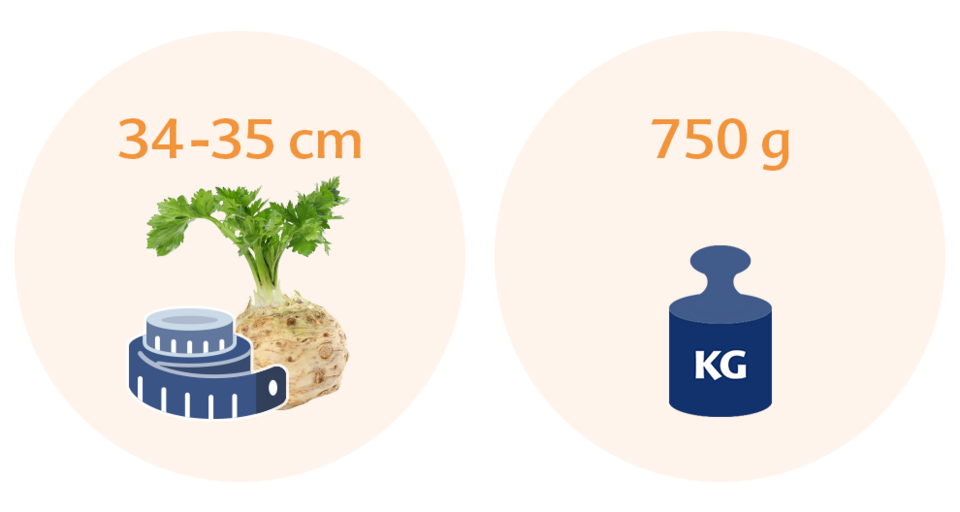Your baby’s development
By week 25, your baby’s eyes are fully developed, and they keep opening and closing them. All that’s missing at this stage is the colour of their iris, although this was determined at the moment of conception from the genetic material of you and your partner and will come in due course.
In the subcutaneous layers of their skin, their capillary system (consisting of tiny blood vessels called capillaries which transport oxygen-rich blood and supply the skin with key nutrients) is now beginning to develop. Now that their skin is being supplied with blood, it will take on its rosy pink colour more and more.
Your baby’s sense of balance is also developing, so that they can refine their movements and move more subtly and with more control than before.
For instance, they can now touch the tip of their nose with their finger and lift their thumb to their mouth in order to suck on it.
When they’re active, they’ll be constantly changing their position. When they’re resting, they’ll usually be in a kind of sitting down position, with their knees tucked up to their body and head lowered.
Development of your baby’s lungs
A baby’s lung tissue usually begins to form in week 16 and, once that happens, the complex development of their lungs progresses quickly. Your baby will need their lungs in order to breathe once they’re out of the womb and no longer have the umbilical cord to supply them with oxygen.
Their lungs aren’t quite fully developed by week 25, so they can’t yet breathe independently. This means their chances of surviving outside of the womb are extremely low, though neonatologists (doctors who specialise in newborns and premature babies) now have the skills and technology to give them a fighting chance.
Your doctor can see very clearly in an ultrasound scan how their lungs are developing. This could be crucial if there is a risk of premature birth, as there are drugs that can speed up the development of an unborn baby’s lungs.
What it’s like for the mum-to-be in week 25
There’s constant movement in your belly, and you may be able to tell when your baby’s tiny arms or feet are pressing against the abdominal wall in the form of small bruises or bumps. It will be clear to you by now that your baby is surprisingly strong – if their kicks hit the organs around your womb, it can really hurt.
Common signs and symptoms
Stomach ache
There are several possible reasons for stomach ache during pregnancy: the pressure your uterus puts on the surrounding organs, an overloaded stomach, a very full bladder or intestinal wind. These symptoms are normal, but if they become severe, visit your doctor.
Midwife’s advice
If you get these symptoms, you should start eating smaller meals more often rather than one big meal. This will avoid overloading your stomach.’ Dorothee Kutz, midwife
Practice contractions ahead of the birth
Something else you may notice in week 25 is that your uterus hardens or tightens for short periods of time. These practice contractions (more formally called Braxton Hicks contractions) can happen without any warning at any time, day or night, and are your body’s way of preparing its muscles for the upcoming birth.
Even though this tightening might stop you doing whatever you were doing, it won’t be painful. Your uterus is contracting, but these practice contractions aren’t yet as intense as they’ll need to be when you give birth because your body isn’t yet producing the necessary hormones. As a result, these practice contractions won’t result in your cervix dilating.
It’s well-known that practice contractions can also be affected by the mum-to-be’s mental state: being stressed or emotionally burdened can make them more intense or more frequent. If this is the case for you, make an appointment to see your doctor to make sure that these contractions have not affected your cervix.
Questions you may want to ask your doctor or midwife
There are sure to be all sorts of thoughts, feelings and worries running through your head in week 25. It’s always worth writing them down to jog your memory when you next visit your gynaecologist or midwife.
Intensity of the practice contractions
If you’re unsure if your practice contractions really are harmless, ask your doctor or midwife. They’ll be able to put your mind at rest that these are not genuine contractions happening prematurely by carrying out a cardiotocography (CTG) scan to check that your cervix is as it should be.
It’s worth knowing that almost every pregnant woman will have a CTG scan sooner or later, usually at some point from week 29. Your baby’s heartbeat will be checked every time you go for an appointment, and as it’s not possible to hear it with a stethoscope until relatively late in the pregnancy, the doctor will usually use a foetal monitor or CTG to listen to it (this also has the advantage that you can hear it too). A routine CTG is not normally required during pregnancy and is only carried out in certain circumstances, such as if there’s a risk of premature birth, if you get premature contractions, if you haven’t delivered by your due date, or if your baby has an irregular heartbeat.
Eating small quantities of food at a time
Your midwife can advise you on what eating habits you should get into from week 25 to ensure you and your baby get the nutrients you need and feel well. You’ll find it harder and harder to eat large meals, and your digestive system may cause you problems, so it’s a good idea to listen to the tips she has for you.
Energy balls are full of fibre, aid digestion and supply you with important vitamins and minerals. Many women also enjoy them when breastfeeding, as they’re fun to prepare and are a healthy way to boost your energy levels.
Information about the author:
Juliane Jacke-Gerlitz is a registered nurse. She has been working in the field of mother and breastfeeding counselling for more than ten years. Currently she is working as a medical writer and psychological consultant. Juliane Jacke-Gerlitz has been married for 22 years, is a mother of eight children and lives with her family in Halle.






